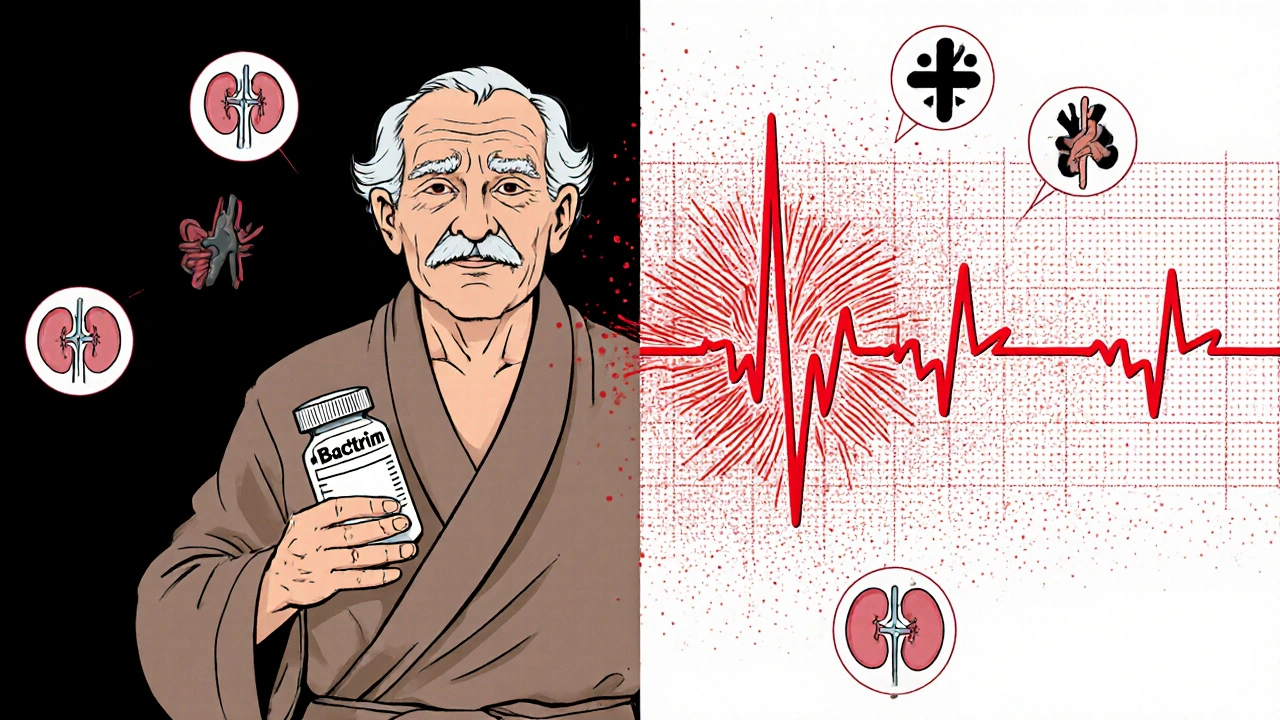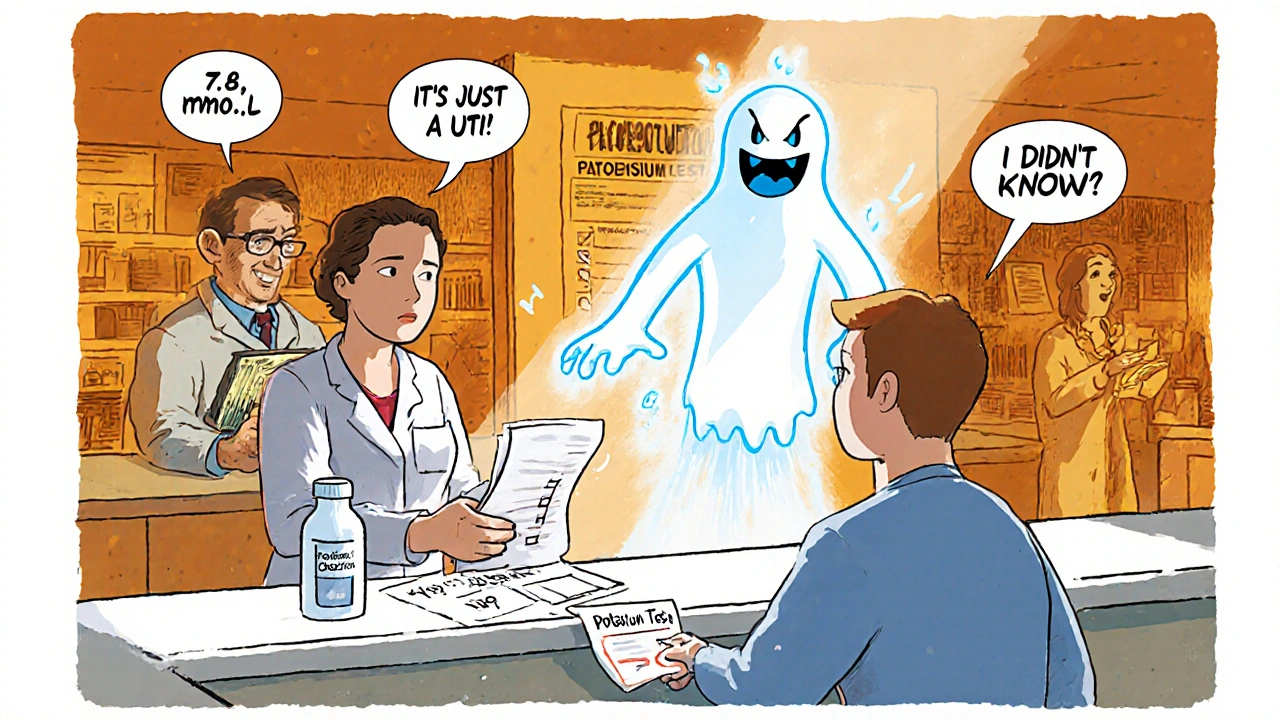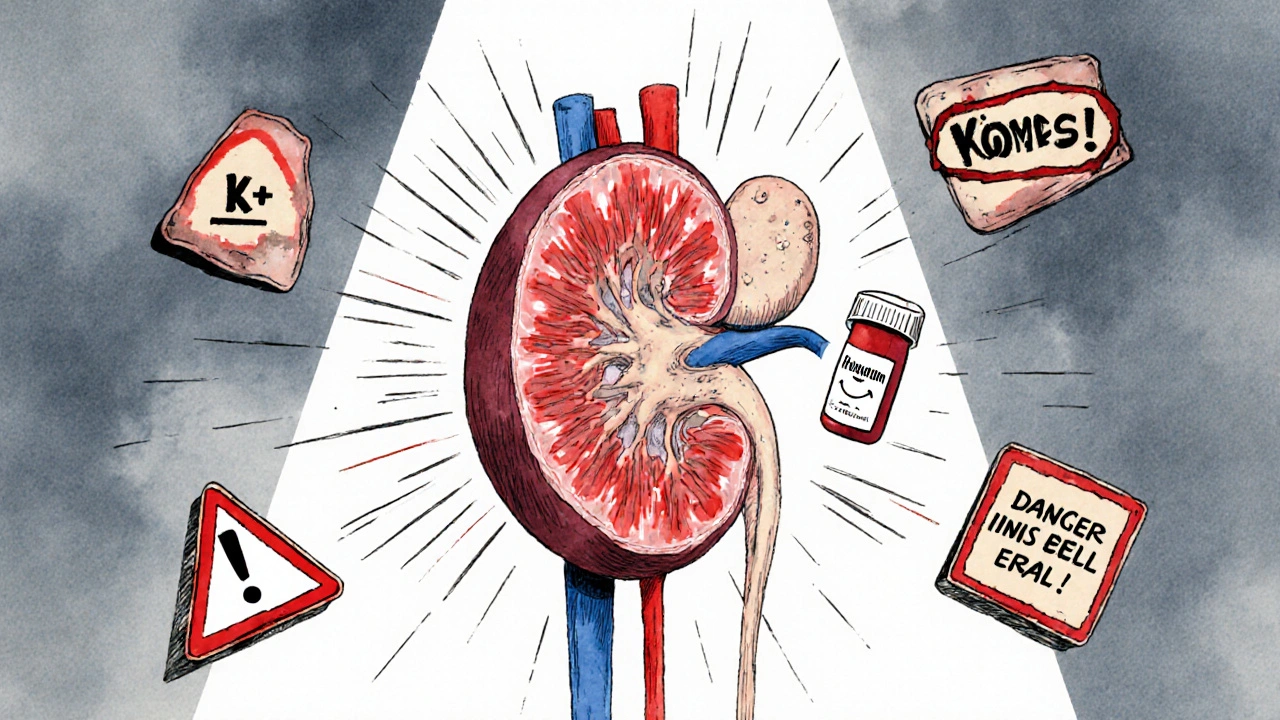Hyperkalemia Risk Calculator for Trimethoprim Users
Assess Your Hyperkalemia Risk
This tool helps you understand your risk of dangerous potassium elevation when taking trimethoprim based on factors like age, kidney function, and concurrent medications. Normal potassium levels are 3.5-5.0 mmol/L. Levels above 6.0 mmol/L can cause life-threatening complications.
Most people think of antibiotics as simple fixes for infections - pop a pill, feel better. But trimethoprim, a key ingredient in the widely prescribed antibiotic Bactrim (trimethoprim-sulfamethoxazole), carries a hidden danger that many doctors and patients still overlook: it can spike your potassium levels to dangerous, even deadly, heights. This isn’t a rare side effect. It’s a well-documented, predictable, and preventable risk that affects thousands every year - especially older adults and those already taking blood pressure meds.
How Trimethoprim Tricks Your Kidneys
Trimethoprim doesn’t work like other antibiotics when it comes to potassium. It doesn’t just kill bacteria - it acts like a fake diuretic. Specifically, it mimics a drug called amiloride, which is designed to keep potassium in your body. In your kidneys, trimethoprim blocks tiny sodium channels in the distal tubules. This sounds minor, but it has a big ripple effect.
When sodium can’t be reabsorbed properly, the electrical signal that pushes potassium out of your blood and into your urine gets weakened. So instead of your body getting rid of extra potassium, it builds up. Within just 48 to 72 hours of starting trimethoprim, your blood potassium level can jump by 0.5 to 1.5 mmol/L. That might not sound like much, but normal potassium is 3.5 to 5.0 mmol/L. A rise to 6.0 or higher can trigger irregular heartbeats, muscle weakness, or even cardiac arrest.
What makes this worse is that trimethoprim concentrates in your kidneys 10 to 50 times higher than in your bloodstream. So even a low-dose pill - like the 160/800 mg tablet used for urinary tract infections - can cause serious problems. One 2023 case report described an 80-year-old woman with normal kidney function who went into cardiac arrest after just three days on prophylactic Bactrim. Her potassium hit 7.8 mmol/L. She survived. Many don’t.
Who’s Most at Risk?
This isn’t a risk that affects everyone equally. Certain people are sitting on a time bomb when they take trimethoprim:
- People over 65 - Kidney function naturally declines with age. Even if their creatinine looks normal, their ability to clear trimethoprim drops by 40% or more.
- Those on ACE inhibitors or ARBs - These blood pressure meds (like lisinopril, losartan) already reduce potassium excretion. Add trimethoprim, and the effect multiplies. Studies show a 6.7-fold increase in hospitalization for hyperkalemia compared to using amoxicillin.
- People with chronic kidney disease (CKD) - If your eGFR is below 60 mL/min, your risk jumps to nearly 18%. At eGFR below 30, the drug is often contraindicated.
- Diabetics - Diabetes often comes with kidney changes and sometimes concurrent use of ACEIs/ARBs, creating a perfect storm.
A 2020 study found that patients with all three risk factors - diabetes, CKD stage 3+, and an ACEI/ARB - had a 32.1% chance of developing hyperkalemia on trimethoprim. That’s more than one in three. Compare that to the 4.3% risk in people on other antibiotics. This isn’t a coin flip. It’s a loaded dice.
How Common Is This Really?
It’s more common than you think. In a 14-year study of over 4,000 hospitalizations for hyperkalemia, trimethoprim was the top antibiotic linked to dangerous potassium spikes. Even more startling: 14.7 million Bactrim prescriptions are written in the U.S. every year. About 4.2 million of those go to people over 65 - the group most vulnerable.
The FDA’s adverse event database recorded 1,247 cases of trimethoprim-induced hyperkalemia between 2010 and 2020. Of those, 43 people died. Sixty-eight percent of the deaths were in patients over 65. These aren’t just numbers - they’re preventable tragedies.
And here’s the kicker: a 2023 review of 37 case reports showed that 78% of severe hyperkalemia events (potassium over 6.0) happened within 72 hours of starting the drug. That means if you’re on Bactrim and feel weak, dizzy, or notice your heart skipping beats, you’re not imagining it. You need help - fast.

Why Do Doctors Still Prescribe It?
Because for some infections, it’s still the best option. For Pneumocystis pneumonia in HIV or transplant patients, trimethoprim-sulfamethoxazole is the gold standard. It’s cheap, effective, and often the only drug that works. But that doesn’t mean it should be used blindly.
For urinary tract infections - the most common reason it’s prescribed - there are safer alternatives. Nitrofurantoin, for example, shows no increased risk of hyperkalemia and is now recommended by the Infectious Diseases Society of America as the first-line choice for uncomplicated UTIs in older adults or those on ACEIs/ARBs.
Yet, according to a 2023 survey, only 41.7% of primary care doctors check potassium levels before prescribing trimethoprim to patients on blood pressure meds. Emergency room doctors? Just 32.4%. Meanwhile, nephrologists - the kidney specialists - check it 89% of the time. That gap is deadly.
What Should You Do?
If you’re prescribed trimethoprim, here’s what you need to know:
- Ask if it’s necessary. For a simple UTI, ask: “Is there a safer antibiotic?” Nitrofurantoin or fosfomycin are good alternatives.
- Check your potassium before you start. If you’re over 65, have kidney disease, or take lisinopril, losartan, or similar meds, insist on a blood test before filling the prescription.
- Get tested again at 72 hours. Potassium spikes fast. Waiting until your follow-up appointment is too late. Ask for a repeat test three days after starting the drug.
- Know the warning signs. Muscle weakness, fluttering heart, fatigue, nausea - these aren’t just “side effects.” They could mean your potassium is rising. Call your doctor or go to the ER if you feel this way.
- Don’t assume normal kidney function means safety. Many patients with normal creatinine still develop dangerous hyperkalemia. The drug’s effect on potassium is direct - not just a result of poor kidney function.
Electronic health records can help. Hospitals that added automated alerts - blocking trimethoprim orders unless a recent potassium test is documented - cut hyperkalemia cases by over half. You can ask your pharmacy or doctor if they have this safety feature.

What If You’re Already on It?
If you’ve been taking trimethoprim for more than a few days and haven’t had a potassium test, don’t panic - but don’t ignore it either. Call your doctor. Say: “I’m on Bactrim and I haven’t had my potassium checked. Can we get a blood test?”
If your potassium is above 5.5 mmol/L, the drug should be stopped immediately. If it’s above 6.0, emergency treatment may be needed - calcium gluconate to protect the heart, insulin and glucose to shift potassium into cells, or even dialysis in severe cases.
And if you’re on this drug for long-term prevention - like for Pneumocystis pneumonia - make sure your doctor has a monitoring plan: baseline potassium, then every week for the first month, then every 2-4 weeks after that. Don’t let “it’s just a prophylaxis” make you complacent.
The Bottom Line
Trimethoprim isn’t evil. It saves lives - especially in immunocompromised patients. But it’s not harmless, either. It’s a drug with a clear, measurable, and dangerous side effect that’s been known for decades. And yet, too many people are still being prescribed it without a single check of their potassium levels.
If you’re over 65, have kidney issues, or take a blood pressure pill like lisinopril, you’re not just taking an antibiotic. You’re taking a risk that could stop your heart. Ask questions. Demand a test. Push for alternatives. Your life might depend on it.


All Comments
Cinkoon Marketing November 19, 2025
Okay but like... why is this even a surprise? I’ve seen so many elderly patients on Bactrim for UTIs and then end up in the ER with weird heart rhythms. My grandma got prescribed it last year and I had to beg her doctor to check her K+ before she even left the office. She’s 78, on lisinopril, and somehow the doc just assumed her creatinine was fine so she was ‘low risk.’ LOL. No. Your kidneys aren’t a magic box that just works until they don’t.
robert cardy solano November 21, 2025
Been a nurse for 18 years. Seen this exact scenario way too many times. Patient comes in with palpitations, EKG shows peaked T waves, potassium’s 7.2 - turns out they were on Bactrim for a ‘bladder infection’ for three days. No labs done. No warning. Just a script. It’s not that hard to check a basic metabolic panel. Why do we still do this?
Bill Camp November 21, 2025
This is why America’s healthcare system is a joke. We’ve got antibiotics that can kill you if you’re not monitored like a lab rat, and doctors still prescribe them like they’re Advil. Meanwhile, China and Germany have protocols for this stuff built into their EHRs. We’re still relying on some 68-year-old GP to remember one side effect out of 200? Pathetic. Someone needs to sue the AMA.
Lemmy Coco November 22, 2025
just read this and wow… i had no idea trimethoprim did this. i was on it last year for a sinus infection and i felt super tired and my heart was acting weird but i thought it was just the infection. i never thought to ask about potassium. i’m 61 and on losartan… i’m gonna call my doc tomorrow and ask for a test. thanks for sharing this.
serge jane November 22, 2025
There’s something deeply systemic here beyond just a drug side effect. We’ve built a medical culture that treats pharmacology like a checklist rather than a dialogue between physiology and intervention. The body doesn’t operate on isolated mechanisms - it’s a cascade, a symphony. Trimethoprim doesn’t just block sodium channels - it disrupts the delicate electrochemical balance that has evolved over millions of years to keep life stable. And yet we prescribe it with the same casualness we use to hand out coffee cups. We don’t just need more tests - we need a fundamental rethinking of how we view drug action. Not as a target, but as an intrusion.
Nick Naylor November 24, 2025
Let me be perfectly clear: The FDA has known about this for over 20 years. The CDC has issued multiple advisories. The IDSA has published guidelines. And yet - and yet - we still have physicians prescribing trimethoprim to patients on ACEIs/ARBs without checking potassium levels. This is not negligence. This is malpractice. This is institutionalized incompetence. And if you’re one of those doctors reading this - you’re part of the problem. Stop. Just stop.
Sarah Swiatek November 26, 2025
Oh sweet Jesus. I’m a nephrology nurse and I’ve seen this exact scenario play out 11 times in the last two years. One patient - 82-year-old woman, on lisinopril, prescribed Bactrim for a ‘mild’ UTI - coded in the waiting room because her potassium was 8.1. She didn’t even make it to the ER. And the worst part? The prescribing doctor said, ‘She’s always been healthy.’ Healthy? Her eGFR was 48. She’d been on an ACEI for 7 years. The only thing ‘healthy’ about her was her denial. I’m so tired of people thinking ‘normal labs’ means ‘safe.’ It doesn’t. Not here. Not with this drug.
Dave Wooldridge November 26, 2025
This isn’t an accident. This is deliberate. Big Pharma knows trimethoprim causes hyperkalemia. They know it kills. But they also know it’s cheap, easy to make, and doctors are lazy. So they push it. And the FDA? They’re asleep at the wheel. Why hasn’t this been pulled from the market? Because the same people who profit from dialysis and cardiac arrests are the ones who write the rules. Wake up. This is controlled genocide disguised as medicine.
Rebecca Cosenza November 28, 2025
Stop. Just stop. If you’re on Bactrim and you’re over 65 or on blood pressure meds - you’re playing Russian roulette with your heart. No excuses. No ‘but my doctor said it was fine.’ You’re responsible for your own body. Get tested. Demand alternatives. Or don’t. But don’t act surprised when your heart stops.
😔swatantra kumar November 29, 2025
Bro this is wild 😮 I’m from India and we use Bactrim like candy here - for coughs, colds, even fever. No labs, no questions. My uncle took it for a ‘urinary issue’ and ended up in ICU last year. I showed him this post and he said, ‘But it’s just a pill!’ 😭 We need to fix this mindset. Maybe if doctors here got fined for not checking K+ before prescribing, things would change. 🙏